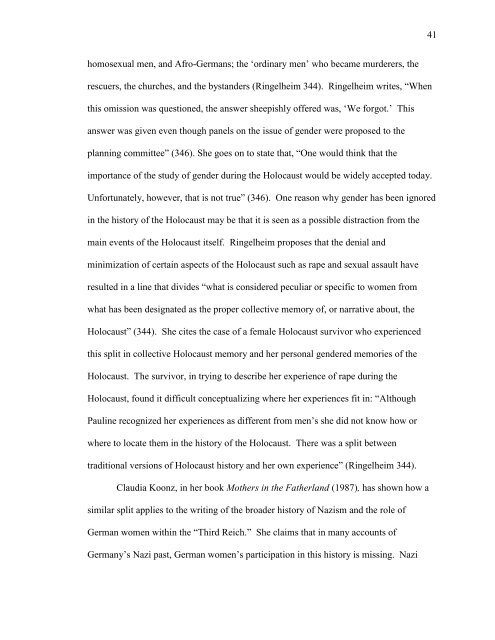'Murderer's House' - University of Victoria
'Murderer's House' - University of Victoria
'Murderer's House' - University of Victoria
Create successful ePaper yourself
Turn your PDF publications into a flip-book with our unique Google optimized e-Paper software.
homosexual men, and Afro-Germans; the „ordinary men‟ who became murderers, the<br />
rescuers, the churches, and the bystanders (Ringelheim 344). Ringelheim writes, “When<br />
this omission was questioned, the answer sheepishly <strong>of</strong>fered was, „We forgot.‟ This<br />
answer was given even though panels on the issue <strong>of</strong> gender were proposed to the<br />
planning committee” (346). She goes on to state that, “One would think that the<br />
importance <strong>of</strong> the study <strong>of</strong> gender during the Holocaust would be widely accepted today.<br />
Unfortunately, however, that is not true” (346). One reason why gender has been ignored<br />
in the history <strong>of</strong> the Holocaust may be that it is seen as a possible distraction from the<br />
main events <strong>of</strong> the Holocaust itself. Ringelheim proposes that the denial and<br />
minimization <strong>of</strong> certain aspects <strong>of</strong> the Holocaust such as rape and sexual assault have<br />
resulted in a line that divides “what is considered peculiar or specific to women from<br />
what has been designated as the proper collective memory <strong>of</strong>, or narrative about, the<br />
Holocaust” (344). She cites the case <strong>of</strong> a female Holocaust survivor who experienced<br />
this split in collective Holocaust memory and her personal gendered memories <strong>of</strong> the<br />
Holocaust. The survivor, in trying to describe her experience <strong>of</strong> rape during the<br />
Holocaust, found it difficult conceptualizing where her experiences fit in: “Although<br />
Pauline recognized her experiences as different from men‟s she did not know how or<br />
where to locate them in the history <strong>of</strong> the Holocaust. There was a split between<br />
traditional versions <strong>of</strong> Holocaust history and her own experience” (Ringelheim 344).<br />
Claudia Koonz, in her book Mothers in the Fatherland (1987), has shown how a<br />
similar split applies to the writing <strong>of</strong> the broader history <strong>of</strong> Nazism and the role <strong>of</strong><br />
German women within the “Third Reich.” She claims that in many accounts <strong>of</strong><br />
Germany‟s Nazi past, German women‟s participation in this history is missing. Nazi<br />
41

















